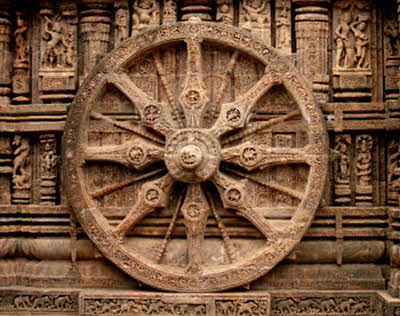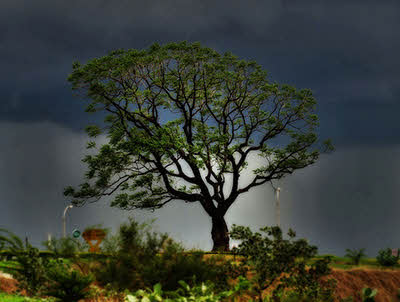
Then Sagara and Priyadarsana were born in the form of twins in the southern part of Bharataksetra in Jambudvipa, in the middle part of the space between the Gangas and Sindhu, in the third period in avasarpini, when there was the eighth part of a palya remaining. In the five Bharata- and Airavata-zones the twelve-spoked wheel of time is the basis of the law of time. Time is two-fold from the division into avasarpini and utsarprni. There are six spokes in avasarpini, beginning with Ekantasusama (Pure Bliss). Of these Ekantasusama lasts for four crores of crores of sagaras, and Susama (Bliss) for three; Susama-duhsama (Bliss-Sorrow) for two, Duhsamasusama (Sorrow-Bliss) for one crores of crores of sagaropamas minus forty-two thousand years; Duhsama (Sorrow) lasts for twenty-one thousand years, and Ekantaduhsama (Pure Sorrow) for the same measure of years. The spokes which are in avasarpini, these have been described. They are the same in utsarpini, but in reverse order. So in avasarpini and utsarpini together there are twenty crores of crores of sagaropamas.
In the first of these spokes, human beings live for three palyas, are six miles tall, and eat every fourth day. They have symmetrical bodies marked with all the good marks, with joints firmly knit as if with mortise, collar and pin always healthy. They are free from anger, conceit, deceit, and greed, by their very nature shunning unrighteousness on all occasions. In it, ten wishing-trees, Madyangas, etc., just as in the Uttarakurus, grant their desires day and night. The Madyangas give sweet wines, as soon as asked; Bhrngas give dishes, etc., like keepers of store-houses of them. Turyangas distribute musical instruments producing concerts. Dipasikhas and Jyotisikas also give unequaled light. The Sucitrangas produce variegated wreaths; Citrarasas, like cooks, produce many kinds of food. Manyangas bestow ornaments at will; Gehakaras fine houses, instantly, like a city of the Gandharvas. With uninterrupted desire the Anangas give clothes. Each of these give many other objects also. Then the ground is sweet like sugar, and the waters in the rivers, etc., are unexcelled by the sweetness of nectar. As that spoke passes, the joints, etc., and the powers of the kalpa-trees deteriorate very, very slowly.
In the second spoke, mortals live for two palyas, are four miles tall, and eat every third day. The powers of the wishing-trees are somewhat less; the waters and the ground-sugar are somewhat deficient in sweetness. In this spoke too, in course of time, as in the former one, abundance gradually decreases, like the size of an elephant’s trunk. In the third spoke, men live for one palya, are two miles tall, and eat every second day. And in this spoke, as before, body, age, sweetness of the ground, and power of the wishing-trees become still less. In the fourth spoke lacking former power, men live for a crores of Purvas, five hundred bows tall. In the fifth, they live for one hundred years and are ten and a half feet tall; but in the sixth they live for sixteen years and are one foot and a half high, filled with pure sorrow. In utsarpini also men must be known to be such (as in avasarpini) in the six spokes in reverse order.
From being born at the end of the third spoke, the twins were nine hundred bows tall; they lived for the tenth part of a palya; their bodies had mortise-collar-and-pin joints, and they were provided with a perfectly symmetrical form. The man-twin with a complexion the color of pure gold together with his wife, the color of the priyangu had the beautiful appearance of Sumeru with a mass of clouds. In the same place, because of the deceit practiced in the former birth, Asokadatta became an elephant, snow-white, with four tusks, like an elephant of the gods. One day, as he was wandering at will, the elephant saw before him the man-twin, his friend of a former birth. Affection sprang up from his body expanded by the shower of nectar of his sight, like a shoot from a seed. He (the man), even though unwilling, was made to mount his shoulder by the elephant, who had seized him and embraced him with his trunk at pleasure. From the two repeatedly seeing each other, the recollection of their former birth arose, just as if shown before their eyes. The other twins, their eyes wide-open with astonishment, saw him, like Indra, mounted on a four-tusked elephant. Then the twins called him by the name ‘Vimalavahana’ (The White-vehicled), because he is seated on an elephant white as the conch, jasmine, and moon.” Knowing ethics (niti) from recollections of former births, having the white elephant as a vehicle, naturally handsome, he became head of all the people.
With the passing of time there the power of the wishing-trees diminished, like that of ascetics whose good-conduct has been violated. The Madyangas gave wine tasteless, scanty, and slow, as if inferior trees had been brought by an evil fate that had changed them. As if powerless from reflecting, “Shall they be given, or not?” the Bhragas when asked gave dishes reluctantly. The Turyangas did not produce such musical instruments, etc., like slave Gandharvas who had been dragged there with abuse. Even though asked repeatedly for light, the Jyotiska-trees, as well as the Dipasikhas, did not emit such light as before, like torches by day. The Citrangas, like disrespectful servants, did not bestow wreaths, etc., quickly as the result of a wish. The Citrarasas did not give as before the fourfold food, like food-dispensary donors whose desire to give is being destroyed. The Maayangas likewise did not deliver manifold ornaments, etc., as if filled with anxiety, “How will they be replaced again?” The Gehakaras made houses slowly, slowly, like poets whose powers and proficiency are dull producing good poems. Even the Anangas gave clothes very reluctantly like clouds that have cruel planets as obstacles giving rain.

As the consequence of such a time, the twins developed a sense of ownership in the wishing-trees, as if in their own bodies. When one of them approached a wishing-tree considered his own by another, it was a great insult to the one having first claim to ownership. Then unable to endure the mutual injuries, they made Vimalavahana their chief, with authority as lord. Knowing niti from recollections of former births, he divided the wishing-trees and gave them to the twins, as an old man divides property among members of his family. He promulgated the law of Hakara for the punishment of anyone who crossed the boundary from desire for another’s wishing tree. As a result of his punishment with the words, “Hah! you did that wickedly,” the twins did not exceed the boundaries, as waters do not exceed the bank of the Ocean. In regard to the Hapunishment the twins thought, “etter corporal punishment, etc., than the disgrace of the Hah!”
When half a year only of his life remained, his wife Candrayasas bore twins. A boy and girl, with lives of numberless Purvas, with good bodies, having the first kind of joints, dark, eight hundred bows tall, named Caksusmat and Candrakanta by the parents, born together, they grew up like a creeper and a tree. After caring for the twins for six months, Vimalavahana died without old age or disease, and was born among the Suvarnaka-kumaras. At the same time Candrayasas died and was born among the Nagas. Moonlight cannot remain when the moon has set. Having completed his own life there, the elephant too attained the state of being a Nagakumara. Such is the power of time. By the law of the Ha punishment alone, Caksusmat preserved the boundaries of the twins, like Vimalavahana. The last period of the life of Caksusmat and Candrakanta having arrived, twins Yasasvin and Surupa were born. Having the (same) joints, figure and color (as their parents), a little shorter lived, they gradually attained growth, like strength and intellect. Always going together, seven hundred and fifty bows tall, the two had the appearance of pillars of, an arch. In course of time Caksusmat died and was born among the Suvarnas, and Candrakanta at once among the Nagas.
Then Yasasvin, like his father, controlled all the twins easily for a long time, as a cow-herd controls cows. Then gradually the Hakara was disregarded by the twins, like the elephant-goad by elephants whose internal ichor is appearing. Yasasvin made the Makara punishment to curb them. In a disease that cannot be subdued by one remedy, another remedy must certainly be applied. He, having great judgment, used the first law for a small offense, the second one for a moderate offense; and both in a serious offense. When their lives were almost ended, Yasasvin and Surupa had a girl and boy together like knowledge and humility. They named the son, as bright as the moon, Abhicandra, and the daughter who resembled the priyangu creeper, Pratirupa, Having shorter lives than their parents, six hundred and fifty bows tall, united like sami and asvattha trees, they gradually grew up. Always they had the beautiful appearance of the holy streams Mandakinis and Yamuna with their waters mingled. When his life was completed, Yasasvin was born among the Abdhikumaras; and at the same time Surupa among the Nagakumaras.
Like his father, Abhicandra ruled all the twins for a long time by the same maintenance of discipline and by the same two laws. Finally twins were borne by Pratirupa, just as the moon, desired by many creatures, is borne by the night. The parents gave the name Prasenajit to the son, and to the daughter the name Caksuhkanta, because she was pleasing to the eye. Having shorter lives than their parents, with the dark luster of the betel-vine, together they gradually grew up like intellect and vigor. Both six hundred bows tall, having equal beauty, they were like day and night of the equinox. After death Abhicandra was born among the “Udadhikumaras, but Pratirupa among the Nagakumaras at the same time.
Then in the same place Prasenajit became lord of the twins. For generally the sons of the eminent are also eminent. Then the twins gradually transgressed the Hakara-law and the Makara-law, as those afflicted by love transgress modesty and the bounds of good behavior. Prasenajit made another law of Dhikkara, resembling a charm for terrifying the great bhut of transgression. Clever in their administration, by these three laws he ruled all the people like an elephant by the three yatas. Then toward the end of the time (i.e. her life) Caksuhkanta bore twins, a boy and girl, whose lives were somewhat shorter. They were five hundred and fifty bows tall, and together increased in size like a tree and its shadow. The son became known among the people by the name Marudeva and the daughter by the name Srikanta. Marudeva, gold-color, with his wife, who was the color of the priyangu, had the beautiful appearance of Mt. Kanaka (Meru) with a row of trees in Nandana. Then after death Prasenajit was born among the Dvipakumaras, and Caksuhkanta at the same time among the Nagakumaras.
Then Marudeva directed all the twins by the same series of laws, as the king of the gods directs the gods. Finally, twins were born from Srikanta, boy and girl, named Nabhi and Marudevi. Five hundred and twenty-five bows tall, together they grew up like forgiveness and self-control. Marudeva, with the beauty of the priyangu, and Nabhi, having the color of pure gold, looked like images of their parents from the identity of color. The life of these two noble persons was measured by numbered purvas and was somewhat less than Srikanta’s and Marudeva’s. After death Marudeva attained the status of a Dvipakumara and Srikanta that of a Nagakumara. After that Nabhi became the seventh patriarch of the twins, and ruled them properly by these three laws.











Good effort have any translation of this book in Hindi.or any translation of kumarpal charter in hindi